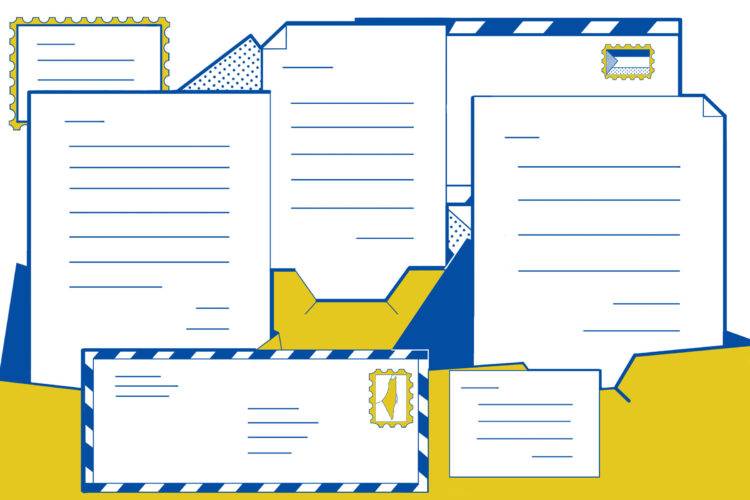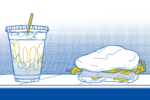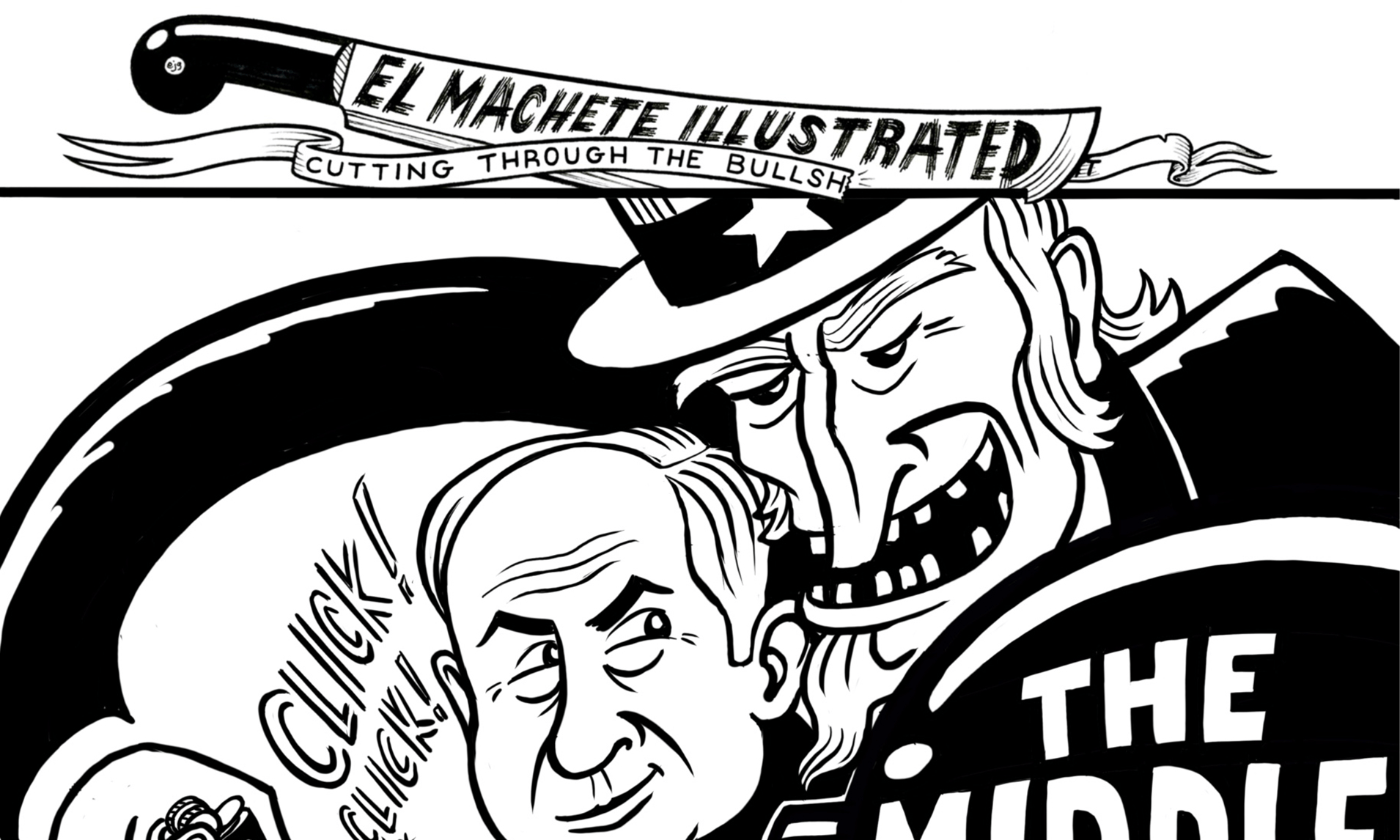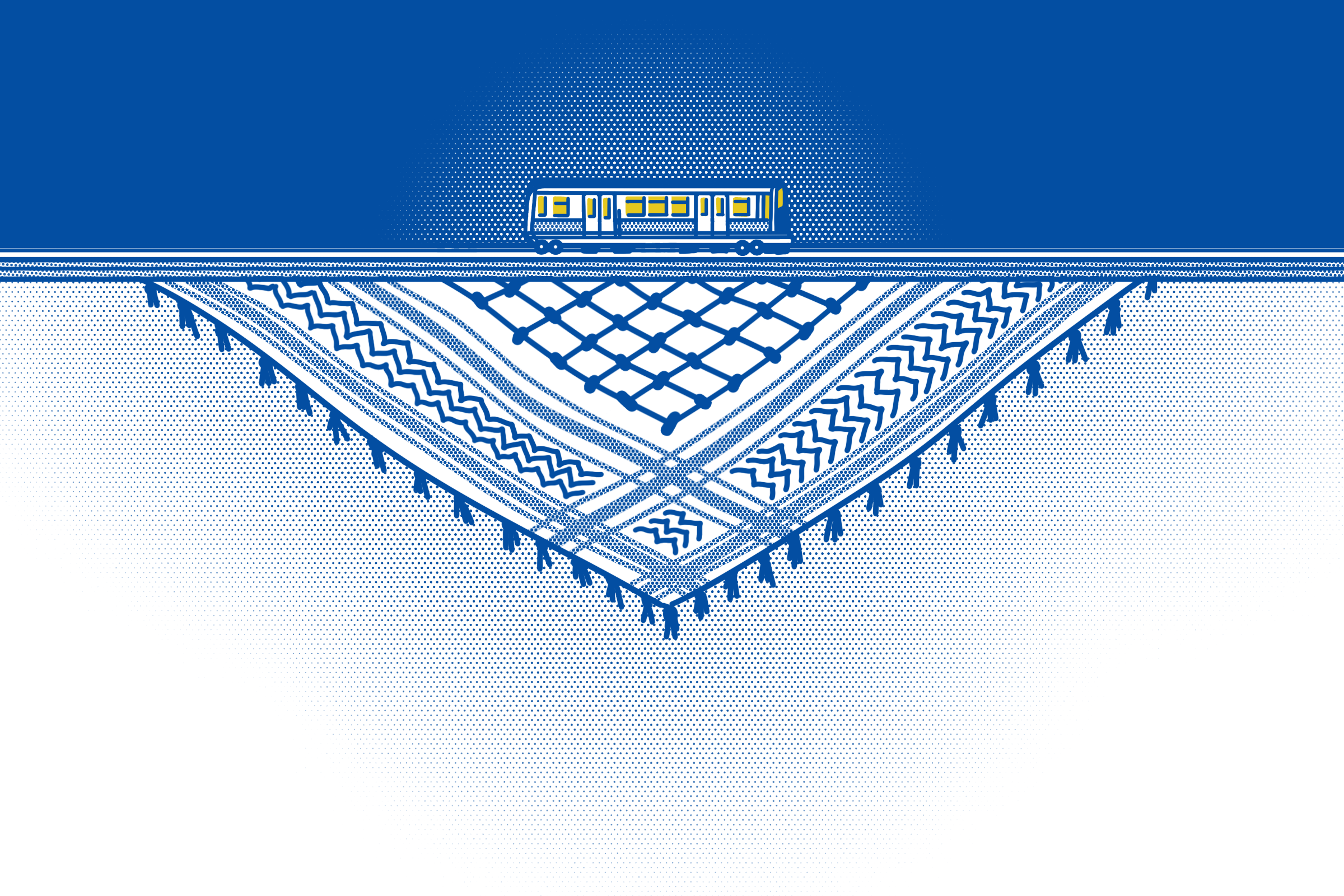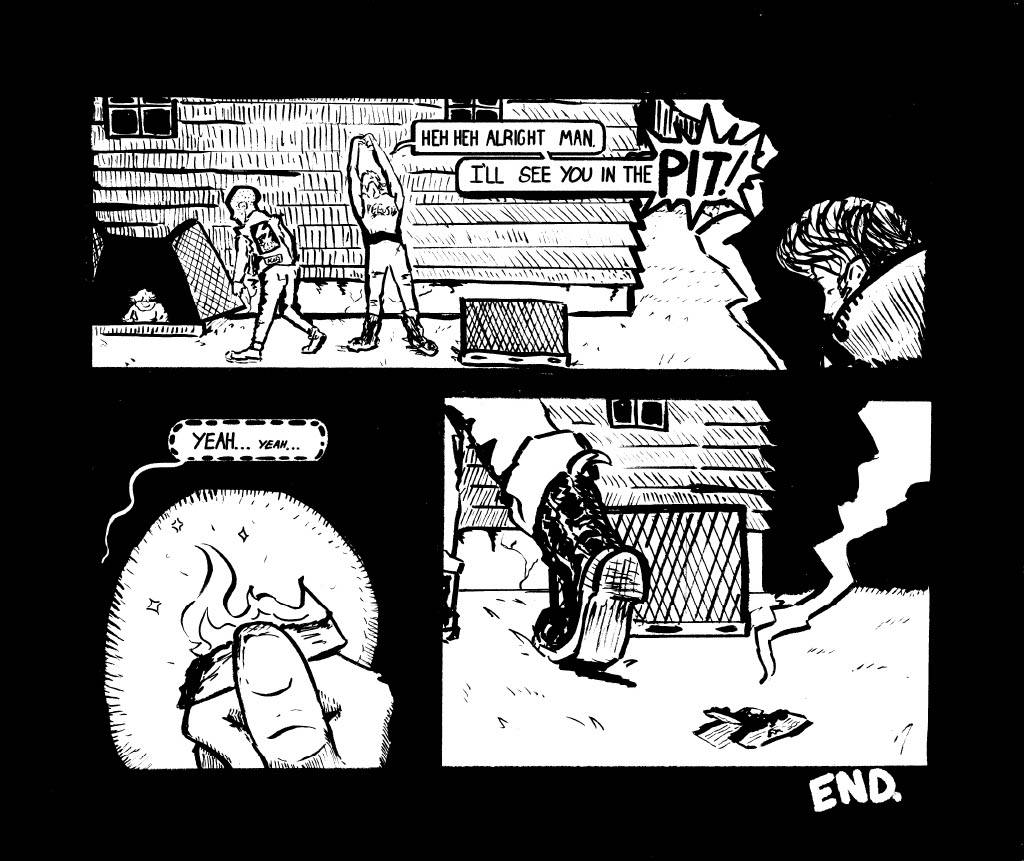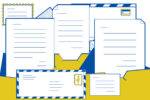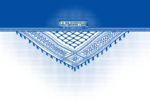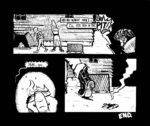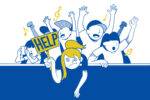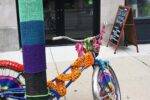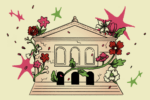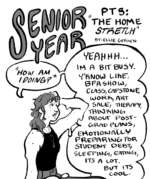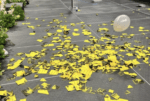Editor’s Note: On Oct. 8, FNewsMagazine shared a form link asking community members to send letters expressing how they feel as they witness the live-streamed genocide in Palestine. These are the submissions we received and the letters have not been edited in order to keep the words true to the authors.
1. Every single day for the past year, we have had to wake up and watch mass death on our devices. Palestinians in Gaza have had to live it — not just this year, but for the past 75 years. This genocide is not only US-backed, but US-led. Our tax dollars fund the blood empire, occupation, and the mass-murder of innocents. And yet we come to school, to work, to institutions that are funded by this very blood money, and we go about our days. We cannot keep on with business as usual. We cannot be desensitized. ALL of our liberation is tied to Palestine.
Sam, Staff
2. Watching the events of the past year unfold has been absolutely devastating. Words cannot describe the constant atrocities Israel is committing upon the Palestinian people and the Middle East. The resistance and power of the Palestinian people is unstoppable, and every single one of us must work in solidarity so that Palestinians can return to the land that was stolen from them, and rebuild the life they have fought to keep for the last seventy five years so that life, love, and joy in Palestine can continue and flourish.
Here at SAIC, we have seen moments of resistance, met with administrative repression. But we have not done nearly enough. We must make enough noise that we are impossible to silence. Our school is both benefiting from and investing in the Crown family whose money is made by murdering, surveilling, and displacing thousands of people in Palestine and beyond. This cannot continue
Every single member of our community should be doing better. Stop thinking about your career as a gallery artist and use your power, privilege, time, and energy to fight and resist.
Our work as artists, as students, and as humans in this world is to fight for liberation. In the classroom, we must make sure that our art and our discourse make it impossible to ignore the war machine that we are all complicit in.
Nao Goldstein, Student
3. It has been a traumatizing year. I am extremely disappointed with both SAIC and my peers’ astounding ignorance, denial, and neutrality. In case anyone hasn’t figured it out yet: there is no neutrality during a genocide. If you’re doing nothing, saying nothing, continuing to live as usual — you are complicit. We pay taxes in a country that has since October 7th, 2023, approved $111 billion dollars in aid to israel. israel is a genocidal regime who will be responsible for the death of minimum 100,000 Palestinians. our school accepts money from weapons manufacturers (i.e., the Crown Family) — we are complicit at SAIC. our school invests in general dynamics — we are complicit at SAIC. Any art we make with facilities on our campus is stained with blood. Something has to change. We need to wake up.
S, Student
4. I am a student at saic and i 1,000,000,000 % condemn genocide, i condemn SAIC at large for the ways in which is is complicit and abusive towards students and faculty broadly.
Maddie, Student
5. In the first few months I was glued to IG and, quickly realizing most people following me were unfamiliar with Palestine, felt a need to re-post as much educational information as possible. An Israeli colleague wrote me a break-up email. A Palestinian friend from grad school left me an emotional voice memo asking “what’s the point; nobody cares.” It gradually became apparent that my algorithmic bubble was tightening, that everyone I was sharing articles with was sharing the same articles. Everyone I followed from Sudan and Haiti kept dropping off my feed. I felt crazy. Sometime around New Years I started struggling with the extreme alienation of going online to get news from the ground and having to scroll through pics of cute pigs, art awards, people’s meals. I began to disconnect in the spring, only using social media when someone would send me a link. More of my energy was going toward supporting people I knew personally at that point anyway.
By the summer I was only getting my news from Al Jazeera and Democracy Now! or word of mouth; I was almost never on social media. Then Israel exploded the pagers in Lebanon. That week, I went back on IG to message my friend and colleague in Beirut, to let him know I was thinking of him, keeping him in my prayers. He wrote me back in gratitude. The next morning, Israel began heavy bombing around the city. Now I’m back on social every other day; it’s the best way I have to check his whereabouts and stay in touch. He mostly posts videos of drones above his house. Still, I check on him, check on Bisan, cry.
I can’t believe we’re here, we’re back to all this, we never left, and still I work everyday at a place that can’t say the word Palestine. I don’t know how to feel about the past year except angry and grief-stricken.
Faculty
6. it has been indescribably difficult to carry the weight of knowing that tens of thousands, hundreds of thousands of innocent civilians are being slaughtered every day with the money i pay through my taxes. it has been indescribably difficult to not burst into tears every waking second knowing that there is little one can do, individually, to stop the indiscriminate killing. “why do we care?” why should one care at all? it is difficult to explain to a person who does not follow the on-the-ground Palestinians who are live streaming the genocide, just how horrific it is. it is difficult to explain the horror that is “the other side of the story” to those who only experience western news media. al jazeera, democracy now, the intercept, haaretz… are reporting, unflinchingly and in grave detail what is taking place.
in the past year, i have seen: people burned alive in tents, children and babies missing heads, limbs, children holding their organs in as they take their last breaths, dozens upon dozens of parents weeping over their dead shrouded children, dogs attacking disabled and elderly people, mass public humiliation of men and women, mass graves, children sniped while walking, playing, sitting quietly, a child who was bombed while rollerskating, a mosque full of pieces of people who were praying when they were bombed, crowds of people mowed down with semi-automatic rifles and drones while approaching food distribution trucks, children killed by air dropped food, bodies run over by bulldozers, live people run over by bulldozers, premies left to die in incubators. i could go on. this is more atrocity than an average person bears witness to in a lifetime. and i view it remotely. the work of the artist is to bear witness. “why don’t you stop watching? why don’t you look away?” the very least i can do is to bear witness, to experience this grief, anguish, hopelessness, and righteous rage. i carry it with me. it’s why i continue to care. and why i continue to ask everyone “how are you not outraged?” “are you not seeing this?”
i am not jewish, i am not arab, i have no family in the middle east. i have friends whose families presently live in israel, who regularly take cover in bomb shelters; i have former students whose families live in lebanon, whose villages have been bombed out of existence in the past few months. they’ve lost siblings, parents, entire histories. for what. for what?
i am an educator, a caretaker, a listener. it is painful, physically, psychologically painful, for me to be restricted from speaking on how i feel, about how my students feel, about the way those of us who are bearing witness are holding and allowing ourselves to be held, in this moment, this interminable year+ of televised genocide. it is also a very special kind of violence that those of us who are witnessing experience… when we dare to speak of our anguish, distress, rage and are met with silence, disavowal, downplay. it’s a thousand times worse than being gaslit. it’s outright denial of what we see, believe, know to be right or wrong. i am held by my communities beyond the institution, those other witnesses. and i know that we are all getting through because we have each other to hold us up, to hold onto, to hold us together, hold steady, hold a torch in the darkness. we hold forth.
this year has felt like endlessly falling.
thank you to the editor for asking how we are doing.
we are not okay.
Faculty
7. This year has been utterly difficult. I can’t yet parse the anger from the grief and the horror. They come in waves. And underneath them is a growing fatigue that is hard to shake off. The violence unleashed by Israel is more and more insidious in its methods, more and more cruel, brutal, unrestrained. I come from Israel, but I no longer comprehend the emotional landscape, the deep blindness, of its people.
Faculty
8. How are we supposed to feel as witnesses to this:
https://tiktokgenocide.com/
Staff
9. How can a school serve as both refuge for soulful openness, wild experiments for a subset, and be fiscally tied to the denial of humanity and self-determination foreclosed on the rest of the world?
I grapple with grave doubts that the training that orients artists to accumulate personal power will lead to widespread good. Is liberation to be found in exceptionalism’s lesions?
I wonder where the profits of fractioned attention and undercut ability to organize are being invested. How quickly are you embarrassed by the sedate meekness of our socialization?
On the eve of a year of genocide, I was walking with my friend to a blockade, when we bumped into two painters on a gallery stoop. I greeted them congrats on the show, and the artist asked where we were headed. When we said the protest, the artist puzzled, asked: protesting what? We each have an MFA from SAIC, three of us faculty. It dawned then the studio navel-gazing we are encouraged to mine for meaning had severed us as agents of transformation in the world. The privilege of creativity had seemed to prune the need to take risks for the worlds we envision.
Does the safely distanced removal of art careerism undercut the human drive to invest in social coalitions and alter the conditions that are objects of our critique? Does the rigor and soul of our student organizers motivate one to do more as teachers, enable, corroborate, act alongside, or be spectators?
Faculty
10. My spirits have valleyed since the murderous convention left town with Lethality stinging
reverberating through my footfalls.
Was it around the time of the last election that we met?
with what unreserve was I able to love you then, unbesieged.
hauled along the grain, grateful for deepened interlocking, the blade of
perception, I thank flint, I bear the shame, the cowardice, the toll of the stain
Of a lineage of people wanting
of sand in my throat
molten crucible to quench
uncoy, address the blockade from
earning the unoccupied
world in which I rageless, love more fully.
11. I am grieving the world I thought I knew. Many of us are continually witnessing the brutal murder of innocent Palestinians in Gaza through social media videos and livestreams. The mainstream news continues to ignore this for over a year. We watch as young Palestinians are forced to document their own genocide for a chance that someone on the other end is watching and will do something to stop this. Young Palestinians the same age or younger than are our own students, spending what is likely their last moments documenting their friends and family suffering around them. While U.S. imperialism is not new, what feels new to me is the silence of those I believed to be progressive. The culture of suppression throughout the U.S. and here at our own school, enacted by the SAIC administration. I believed this school to be a place where one has the freedom to stand up for what is right, to have difficult conversations, to protest. That is clearly not the case anymore, to the detriment of our community and the voices we are witnessing in Palestine.
Faculty
12. A few days ago the NY Times published the testimony of 65 doctors, nurses, paramedics who volunteered in Gaza. They told how they saw young children shot by snipers with deadly accuracy in the head and chest, children mangled and burned, dehydrated, starved, dying from preventable infections, small children orphaned and asking to die.
For anyone who witnessed our Vietnam and Iraq wars, Israel creating a free fire zone in Gaza can seem quite normal, normal as the unlimited US support. But it is still shocking, deeply disheartening to see how people could do such things, and to see how bystanders can refuse to hear the cries of children.
These extremes of dehumanization make it easy to despair of humanity. Or it would be, if we couldn’t find hope and inspiration in this generation of young people who have been shaped by antiracism, the many thousands who have left their comfort for conscience, who speak out and act even at risk to their bodies, their futures, their peace of mind. My wish is for them, for us, to have endurance, to do the learning and work needed to shape a message and grow a movement that can end a war and change a country.
Paul E, Faculty
13. You ask for words but there are no words
to describe the indescribable
no images that will finally break through
and show those who refuse to look.
You ask for words but everywhere language is obfuscating, clouding, shrouding, turning things upside down and inside out
20 years ago, during the Iraq war, it was called “collateral damage.”
today it’s “human shields.”
on the BBC news hour, an IDF spokesman refers to the West Bank as “Judea and Samaria.” The “West Bank” is a colonial invention, but it is home to a few million Palestinians, so even this construct must be erased.
Some questions:
What are we reading? Who are we listening to?
Who is innocent? Who is complicit?
What do u.s. government officials mean when they say they’re “working around the clock” on brokering a ceasefire?
Whose lives are they brokering with?
Why is Israel the exception to nearly everything when it comes to international law, rules of engagement, and so-called “human rights”?
How do you make art in a genocide? How do you make dinner, go to work or school, get up in the morning?
How do you keep on living when millions of people have no right to live?
A few things that we do know:
An occupying power has no right to claim “self-defense.”
There is a land and a people called Palestine.
the U.S. is arming and defending a genocide.
there are words we need to unpack, study, and understand: “settler colonialism,” “u.s. imperialism,” “apartheid.”
Make a list of things you can do:
Learn about the history. Ta-Nehisi Coates reminds us that while it may be dense, it’s not that complicated.
Listen to these teachers (there are so many, but here’s a start):
Abdel Razzaq Takriti, Noura Erakat, Edward Said, Maya Wind, Palestinian poets, Jewish Voices for Peace.
Think about exploding pagers, and remember napalm (watch Harun Farocki’s Inextinguishable Fire at the Video Data Bank)
Persist in defending the right to live. Palestine and Palestinians persist on living despite every attempt to not only kill them, but to erase their culture, their memory, their memory in our memory.
Mary Patten, Faculty
14. I found this response close to impossible to write. My brain cannot hold the actuality of the genocide for very long without short-circuiting. It will hop from subject to subject to avoid landing anywhere besides my complicity in a system that allows families to be bombed and burned alive as they sleep. Often, when students start in my class, we talk about how the specific leads to the universal. My gut is to write about how the live testimony and footage coming out of Gaza filters my experience of the day to day, and perhaps hope that someone who does not watch the news and media that I have seen will feel bolstered to look, to learn, and to witness what has been happening in Gaza, and now happening in the West Bank and Lebanon. And as a teacher during this horrible time, it has been too easy to turn my mind to the infuriating topic of academic freedom (or rather the lack thereof). I’m appalled by SAIC’s bureaucracy that avoids nuance or any discomfort at all costs (nuance and discomfort, essential learning tools for any artist), and our administration that violently betrayed our students who voiced their ideals at the encampment last spring. Focusing on the school allows me to avoid the soul crushing truth that everyday we are witnessing a genocide. My wife is pregnant, I will be a mom, something I could never imagine for myself is happening, and I think how can I bring a child into a world that does not care when babies are bombed in a hospital. Yes, I think seeing live footage of a human burned alive in a refugee tent outside a hospital has changed me forever. But what the f— is my change compared to the loss of that person’s life?
I have seen dead Palestinian children almost every day for months now. I have seen children with their heads blown off. I have seen children with their limbs blown off. I have seen children covered in dust that used to be their homes staring into the distance forever. I have seen dead Palestinian children almost every day for months now. I have seen an impossible amount of their blood pooling in the dirt next to them, and I have seen the inside of multiple children’s bodies. I have seen dead Palestinian children almost every day for months now. I have seen dead Palestinian children almost every day for months now.I have seen dead Palestinian children almost every day for months now. I have seen dead Palestinian children almost every day for months now.
And then I come to teach art, knowing that many of my students have seen these same images. Knowing that acknowledging the factual genocide of Palestinians can put both my students’ time at the school as well as my own at risk. But the bare minimum we can do is acknowledge it. I try to make space for my students to come to me, whatever their feelings are, as I know many of my colleagues do too. What is the purpose of art school, if I cannot talk about the injustices in the world, and my students cannot make work about it.
I come to teach class, and think of the dreams of my students, the dreams this school profits from hand over foot, and cannot hold that the majority of the schools, libraries, and museums in Gaza are rubble. That on average 250 Palestinians are dying per day, and that while we were in class, we know someone in Palestine has died and we will never get to benefit from their dreams in the world again.
I have always found the task of teaching young artists daunting. It is not just the teaching of technical skills, like drawing, or sculpting, with benchmarks you measure, but the largely idealistic, unquantifiable, and (often wonderfully) nebulous skills like sustained questioning of the status quo, wonder for the world around you, and an ability to continue to make artwork when there is often no capitalist incentive. It requires a lot of honesty and willingness to sit in discomfort, and quite frankly, it is a lot harder than giving a letter grade and moving on without feedback. Most folks who teach artists come to it with the basic framework that we respect and believe in our students. We believe sitting in discomfort with them, being honest with them is worth it, because they will learn from it and make something exciting, they will be honest with us, and we will learn from it too.
One thing among a million that was so frustrating after the encampment last year was the infantilizing of our students’ ideas and goals and demands after the school spent so much time and money promoting the idea of the SAIC student being the “Citizen Artist.” The students at the encampment and on the streets in support were taking everything you would want a young artist to learn and applying it, and were met with dismissal and gaslighting. As soon as our students became the citizen artists we asked them to be, they were abandoned.
I am however so heartened and utterly impressed to see, despite their mistreatment, so many students continue to engage and learn from their time at the encampment; connecting oppression and communities worldwide, including showing such strong allyship with faculty (perhaps stronger than what they have been shown in reverse overall, an imbalance I hope as faculty we can continue to correct).To be honest, it keeps me going.
Our students deserve better, and though this is supposed to be a broad letter to all, to the administration I say: You either respect our students or you don’t. Get it the fuck together. Sit in discomfort with our students. If you believe in them and their minds and their dreams, have the actual hard conversations about Palestine and anti-semitism, and why the two are wrongly conflated, and above all listen to them. And if you don’t believe in them, quit your job.
Look at the media our pro-Palestinian students are consuming, the live testimonies of people on the ground in Gaza, and see if you don’t feel the same way they do after seeing these images of death. I know, our students are not a monolith, but I question which students on campus are listened to and why, and I encourage you to do the same. We as a school are capable of having difficult conversations. This does not negate our ability to hold and care for the grief of everyone in our diverse student body.
Part of my zealousness in this writing has come from the fact that the overwhelming majority of students who have come to me since October 7th, saying that the school does not care about them and expressing their concerns about the world, have been pro-Palestinian. That includes the majority of my Jewish students who have come to me too. And I have not heard their voice recognized once by the administration.
I have seen dead Palestinian children almost every day for months now. I have seen dead Palestinian children almost every day for months now. I have seen dead Palestinian children almost every day for months now. I have seen dead Palestinian children almost every day for months now. I have seen dead Palestinian children almost every day for months now. I have seen dead Palestinian children almost every day for months now. I have seen dead Palestinian children almost every day for months now.
Sarah Bastress, Faculty
15. In the past year, all my discomfort within this institution has proved true and not merely some sort of lack rooted in me. As an Afro-Latina, I have never felt that SAIC was a space that catered to me, cared for me, or well represented me and my upbringing. SAIC has always been the epitome of climbing the social ladder, but where does it lead? Although there are courses, lectures, and brief speeches of solidarity, all of this theoretical solidarity seems to have vanished at the hands of SAIC’s solidarity with the Israeli occupation and genocide of the Palestinian people. Many members of our community, including students, strangers, and faculty, stood with the heart of SAIC (the revolutionaries, the freedom fighters, those of us that feel deeply, the true artists of this institution) as we grieved. We have been alchemists in the past year, taking all the challenges this institution has given us after so performatively expressing their liberal and revolutionary beliefs and disrupting the peace. Where there is no justice for oppressed people, there cannot and, hear me clearly, WILL not be any peace. We are standing on the backs of Black revolutionaries and the ways they have paved for us to achieve true liberation and true peace.
On the day of our encampment last spring, 69 members of our community were brutally arrested by a SWAT team. Degrading, hurtful, and disrespectful to say the least. Dangerously, this institution sicked the largest gang in the United States onto its very own students and then proceeded to write statements discrediting our efforts. I am beyond angry, yet I am not disappointed. This institution has always been a house built on sand, with its falsehoods, lies, and complicity in the ethnic cleansing of Indigenous people while having signs outside of 280 that claim to honor the Native Americans whose land we still occupy. Absolute hypocrisy. How can an institution that applauds resistance theoretically encourage its artists to bring change to the world, simultaneously reprimanding and physically beating its students for taking theory into the streets? Palestinians deserve more. SAIC, a year later, is still complicit as ever, with blood money touching every inch of our beings. POC students at this institution deserve safety, care, true allyship, and community. We deserve to voice our grievances and be heard; we deserve to hold more weight than these figureheads who pull all the strings. Clearly, we see that entering this institution and abiding by its rules will still make us pawns. We are not revolutionary for having conversations; we are revolutionary for taking action, even when that action defies the very people who claim to be in solidarity. We see through your facade, SAIC; you have shown your true colors time and time again. Through this horrifying genocide and your continued complicity, you have done all the heavy lifting. You have exposed yourself to your own student body and the world for your colonial, imperial, and genocidal feats. Do not expect letters of praise from me or any student at this institution; we will always remember your callous complicity.
Free Palestine. I couldn’t flesh this out as much as I want because the student body is not only overworked with classes but also dedicated until the end—until Palestine is free. A big f— you to Martin Berger and Elissa Tenny and every member of our faculty who smiles in our faces, watches us cry, and still has not changed. We see you; we will not stop, and we will not rest until you disclose where our money is going and divest from the Crown family, thus divesting from genocide.
Student
16. The genocide in Gaza has broken me every single day. I cry at the bus stop watching images of children maimed by an army paid for with my tax dollars. It is wholly unacceptable that this has gone on for one day, much less over a year.
Faculty
17. I have never felt safe on campus as a Jew, but in the past year, my safety at school was actively threatened. I love my homeland. I love my language. I love my culture. My family was expelled from the Levant (Eretz Yisrael) to Europe in the 1800’s by predecessors of the Farhud, and then were forced to flee to Europe for a few decades, before ultimately being forced to flee, AGAIN, to America during the Holocaust. I still have family in the Levant today. No one at this school, ESPECIALLY, my peers afford my people dignity, grace, or time to mourn. And when I say my people, I don’t just mean Jews and Israelis. I mean Levantine people. I mean Palestinians.
The only solace I have been able to find at this school that is filled to the brim with incredibly privileged people claiming they know my history and my people better than me… Is the people who SAIC expects me to want to murder and steal from. I’ve had conversation after conversation with the Palestinian people in my life, and through tears, laughter, hugs, we ask ourselves… What do we wish SAIC knew about us? The answer is always the same. We just want people to listen. Students nationwide are obsessed with us. Encampments. Protests. Endless Instagram infographics being posted about us. I appreciate the passion, and search for justice. It is a deeply righteous cause. I just wish that these people who spend so much time talking about us, also talk to us. No one asks about the people in my life murdered by Hammas. No one asks my friend about their grandfather in the Westbank occupied by the IDF. No one listens when I say Netanyahu is deeply hated and detested by Israelis. No one listens to my friends when they say Hammas are not “freedom fighters”. Instead, we just sit, and ask one another if they know if the other’s family and friends are still alive, while people donning keffiyehs they bought online breeze right by us.
Palestinians and Israelis know diaspora. We know ostracization. Our histories, land, and language are woven together. I wish people at this school would spend more time trying to build community with us, rather than fanning the flames of a division that didn’t start on October 7th, nor in 1948, but thousands of years ago.
The only person from this school who checked in on me about October 7th was Palestinian. A Palestinian in love with their land, culture, and people. The only person from this school who reached out to my friend as the IDF set their horrific and unjust siege on Gaza on October 8th, was me. A Jew in love with her land, culture, and people.
On Passover, my people say, “L’Shana haba’ah B’Yerushalayim” which means, “Next year in Jerusalem”. This acknowledges our displacement from Eretz Yisrael, and how we have become a diasporic people, and how we hope to come home. But I have been saying it well past Passover because I am fighting for a day when the corrupt Israeli government, and IRGC proxy groups will release its hands from our necks, so that way, Israelis and Palestinians have the sovereignty, justice, and reparations necessary to break bread in Jerusalem together.
Fran, Student
18. Hello,
I have begun this letter countless times now, and yet the words to adequately express my anger persistently escape me.
I am appalled by the absence of empathy among my peers, especially within the graduate schools. It seems that the institution attracts a particular kind of graduate student—one who has resigned themselves to forfeiting their creative autonomy, clinging to the hope that the institution will somehow validate their artistry. The irony, of course, is that the price for this validation is becoming a hollow puppet, offering nothing of true substance. The undergraduates, however, give me some hope. They are the only reason I continue to devote my energy to organizing against the Crown family, the Art Institute, and its subsidiary school.
What’s worse is the overwhelming silence from the faculty and administration—those who should be supporting the students most. It is beyond disheartening to realize that those tasked with guiding our education show so little concern for the well-being of their students. If they will not stand with us in moments of crisis, how can we expect them to offer anything of value in the classroom? Their absence reflects a deep failure, both personal and institutional. To call it poor form is an understatement; it is negligence.
A great shame should hang over them for their complicity.
Sincerely,
Anon, Student

